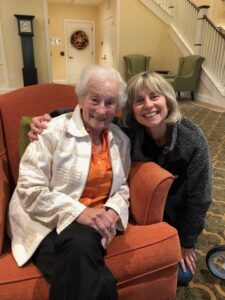By Nance Ebert, Contributing Writer

Photo/Submitted
REGION – People today are living longer lives, thanks to advances in science and medicine. While this is a positive development, it is becoming increasingly common for children over the age of sixty to be taking care of their very elderly and often fragile parents.
This poses many challenges for the older caregiver. Many are dealing with family members who are physically limited, have health issues and some who are lonely or depressed and more.
Mother and daughter share strong bond
Sheryl Sigel of North Grafton explains that one of the challenges she finds with her mom, Elaine Kulberg, who is in her nineties, is to constantly combat her loneliness. She continues to find creative ways to help her mother see the value in her life where she is now. She loves being with her mom and while she acknowledges that it is a huge responsibility, it is one that she gladly takes on.
“A lot of people who she loves are gone. My mom constantly questions how she got to this point. Even though she repeats herself often, I have learned to change the way I respond. Where I used to get angry and correct her, I now act as if I am hearing it for the first time. This has been extremely helpful,” said Sigel.
One of the challenges of caring for a parent when you are getting up in age yourself is finding the time to spend together. We all lead busy lives with work and other commitments. Even when an aging parent is living in an assisted living type of situation, there never seems to be enough time. Plus, older family caregivers may have health struggles of their own.
“Before leaving, I always tell my mom that I love her and give her a warm embrace. I think this physical contact also makes a huge difference in her demeanor,” said Sigel.
Marlborough program offers social outlet
Trish Pope, Executive Director for the Council on Aging at the Marlborough Senior Center made mention of an ongoing program called Daybreak that offers a four-hour session once each week where caregivers can bring their aging family member to interact with other seniors.
“This program offers the caretaker a well-needed break and benefits both the caregiver and their loved one. It is a chance to take a breath and recharge. A lot of other social day programs are cost prohibitive,” said Pope.
Support for family caregivers
Cindy Opper, LICSW, has worked for almost thirty years as a psychotherapist and consultant to nursing homes. She specializes in geriatric mental health, providing caregiver support and promoting successful aging. She works directly with residents struggling with their emotions of not wanting to burden family members. Many are very angry and have given up to the point that they no longer have the will to live.
“In generations past, it was common for families to simply have an aging parent live with them. Today, there is a guilt factor with not caring for an aging loved one at home. Caregiving burnout and stress is also a real thing and many experience it, not just family members. Aides and staff are spread very thin as well,” said Opper.
During COVID, she started a Facebook support group called The Oasis for caregivers. Her goal was specifically to show caregivers some compassion in making some tough decisions for their elders at home. It also provides an escape to vent and share their feelings and help with guilt associated with burnout.
Heather Trafton, President of the Mass Advantage health plan, shared a wealth of helpful tips, as she also worked directly with a senior population as a practicing physician assistant for many years.
“First and foremost is safety in the home for independent living and fall prevention. Medication management and knowledge is crucial. Keeping a list of medications and medical history is so helpful. It can be kept on the refrigerator. The caregiver should also have a copy,” said Trafton.
Understanding benefits like dental, fitness, glasses, hearing aids, food help, over the counter reimbursement and more are also important for the caregiver to consider and research. “There are many community service organizations that offer food, transportation and more. You need to know to ask for these resources. If a parent is complex, they might greatly benefit from a geriatrician,” said Trafton.
RELATED CONTENT:
Clinical studies offer opportunities for family caregivers (fiftyplusadvocate.com)
Alexa Together is next generation of remote assistance for older adults (fiftyplusadvocate.com)
Tax credits possible for family caregivers (fiftyplusadvocate.com)












